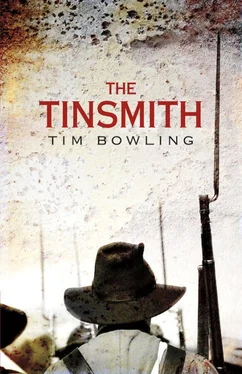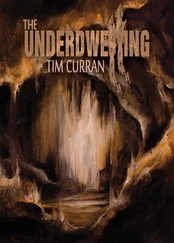Mary Lansdowne, who had slipped quietly away, returned with a blanket. But as she laid it over the still form on the ottoman, the girl suddenly rose up, her eyes wild, and the blanket slid off.
“Louisa, dear, it’s Aunt Mary. Your mother’s on her way. Oh, child.”
The girl’s dark eyes flared, then rolled back. She opened her mouth, but no sound came.
Anson sent Mary away with the cloth, which was already warm and damp. Lightly he touched the girl’s brow. The fever was very high. The blanket on the floor might have been a skin shed by fire. Seconds accumulated very slowly, heavily. Mary returned. Anson placed the cloth on Louisa’s burning brow. Then he listened to the pulse again until the rapid hoof beats struck the ground outside and the child’s mother rushed into the parlour, a whirling descent of black in the yellow light, her long hair loose, her eyes almost as wild as her daughter’s. She smelled thickly of rain and mud. Her skirt bottom was drenched and splattered from the half-mile ride along the slough bank. Anson rose and withdrew a few steps to give Edney a clear path to her child’s side. In a silence much more disturbing than cries would have been, she threw herself on the girl’s breast. Anson watched Edney’s shoulders shake violently and a sense of horror rose in him. Why didn’t she cry out? Why didn’t she speak the child’s name? She looked like some animal feeding off its kill. Anson fought to quell the gruesome image.
“Edney. Oh, Edney, please,” Mary Lansdowne moaned.
Anson turned and saw that Mary’s hands were at her mouth. Where was the girl’s father? It would be his duty to lift the mother from the girl. Anson could hardly bring himself to consider doing so, but if the woman didn’t raise herself soon…
Henry Lansdowne entered the room and spoke softly in his wife’s ear.
“Not back?” Mary said, then lowered her head at her husband’s stern look.
The two returned quietly into the shadows.
Anson could no longer abide the mother’s terrible, almost silent grief.
“Madam, compose yourself.”
But even as he spoke, he felt foolish and very far removed. It was as if he stood above a woman slowly transforming into an open grave. He almost expected the floor to give way and all of them to be swallowed by the earth. Some terrible moment was at hand, more than illness, more than a human death. Now Anson did not want the woman to rise. Any change would trigger the greater death he could not even imagine.
Then Henry Lansdowne emerged from the shadows and brusquely took Edney by the shoulders and lifted her. “Mary,” he said to his wife, who then supported Edney on the other side. Together, they sought to remove her from the parlour, turned her slumped figure doorward.
Anson tried not to see, but it was as if his eyelids were pinned up. The mother’s face floated into the dim light like something dead that had been trapped a long time on the bottom of the sea, yet as it rose it seemed, inch by inch, to be shocked back into sentience by a grinning blackness whose silent mirth trembled all around them. But the thought and feeling that flooded into the eyes were blank in their fathomless searchings. Anson, though he had witnessed similar suffering before, had never become immured to it. The sense of an intense misery just withheld was almost too much to bear, especially here, when he had already imagined himself on the way back to Antietam. The room was like a surface of water out of which, at any instant, a powerful force must explode. If there was skin on the mother’s face, Anson couldn’t see it. If there was a woman in the features, it was a woman Anson had never encountered, not even in a nightmare. Yet the grief was human. That was the most awful part of it. Fifty thousand dying men, fifty thousand grieving mothers, were screaming without sound in the brief bone frame that hung before his eyes, eyes that he could not close.
Then she was gone and Anson stood alone above the child’s fitful fire, wondering if even the music of Chopin could ever wash that screaming from his sight.
They moved the child to an upstairs room, the uncle cradling her and walking slowly, as if leading a procession. But Anson alone attended the move, for the mother remained bone-white and trembling in a chair, with her sister-in-law dutifully at her side. Alone with Henry Lansdowne, Anson waited for the man’s questions: What illness? How serious? What about quarantine? But even now the Englishman remained mostly mute. He did thank Anson for his help, but implied in his manner and tone was a criticism—no doubt he suspected Anson of knowing more about his niece’s piano playing than he was admitting to.
For his part, Anson cared only about the girl’s condition. Though almost in shock himself at the terrifying image of the mother’s grief, he settled into a bedside chair and prepared for a night-long vigil. Even if he could do nothing to prevent a sudden death, or even if the crisis was yet weeks away, he realized that a doctor’s presence, at least, might comfort the patient’s family. And then, oddly, he felt that the mother’s grief was itself a threat, as if her initial black descent upon the child would, if given another opportunity, usher in the permanent darkness.
The night passed slowly. At times, Anson thought he heard a weeping in the air but suspected his imagination had been stirred by the proximity of death. Toward daybreak, with the girl’s fever unchanged, he stood and went to the open window. The sky was a blood-tinged gauze to the north, but the river and near distance were still a rich, impenetrable black. As far as he was concerned, it couldn’t lift fast enough. Night seemed a smothering contagion, a poxed blanket, not a sanctuary of calm. It was always so when a child lay sick. Somehow daylight was the earth’s equivalent of bracing health, perhaps because the sun draws children out as a field of flowers draws honeybees. For the old, of course, the night becomes almost a welcoming portal to whatever lies beyond the grave.
Shortly after the tin press began its usual thunking of the silence several rods downriver at the cannery, the girl’s mother and aunt appeared. They came in as softly as gusts of black snow and settled on each side of the girl, their drawn, chalk-white faces like twin moons. Anson knew his presence was superfluous. But before he retired to his own room for perhaps a few hours of broken sleep, he studied the mother’s manner.
Standing at her daughter’s bedside, bent over at the waist, she was certainly changed from the terrible, almost inhuman creature of earlier: her dark eyes had resumed their focus on the surroundings, her hair, in two tight braids, reflected the general control that had come into her body, and she looked, more or less, like any woman in the throes of concern for a child. Even the way she rubbed her hands together in her lap, one palm circling the knuckles of the other hand, was familiar to Anson, almost like an action taken from a primer on maternal behaviour.
And yet he could not forget the face as it had been revealed in the parlour. A slight trace, evident in the quivering of the nostrils, which looked unusually pallid in the dimness, suggested an almost failing balance on the side of sanity. And so, before retiring, Anson took Mary Lansdowne aside and pressed on her the importance of not leaving the mother alone with the patient.
“In my experience,” he said, “shock combined with solitude is a highly dangerous mixture.”
The woman nodded dumbly, but Anson felt he could depend on her.
Moments later, he lay on his bed and tried to find the memory of sleep among all the other memories that flitted through his consciousness, memories of dying men far from their mothers’ or wives’ attendance or even the comfort of familiar smells and sounds, memories of his own frail mother on her deathbed thirty years before, followed by the more painful memories of his beloved Elizabeth on hers.
Читать дальше












